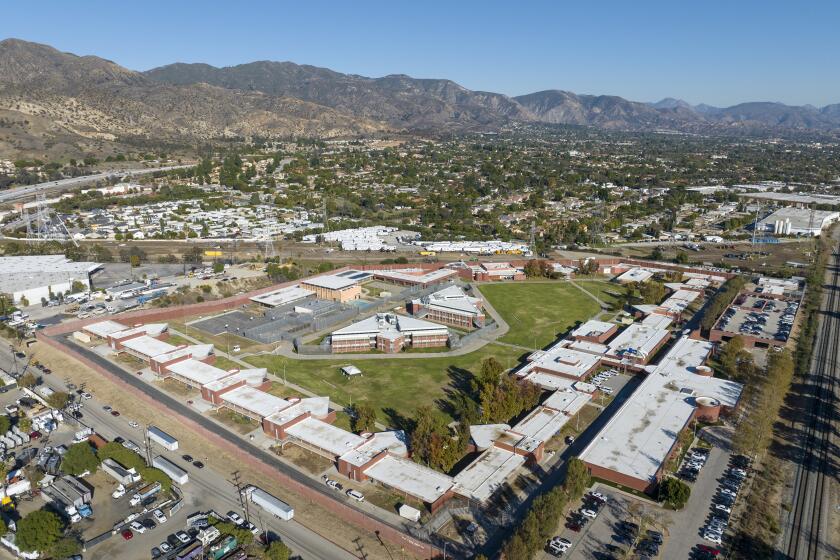A day in the strawberry fields seems like forever
He finds kindness and camaraderie with the Mexican immigrants picking strawberries. But he also falls far behind them as his back tightens and his muscles burn.
- Share via
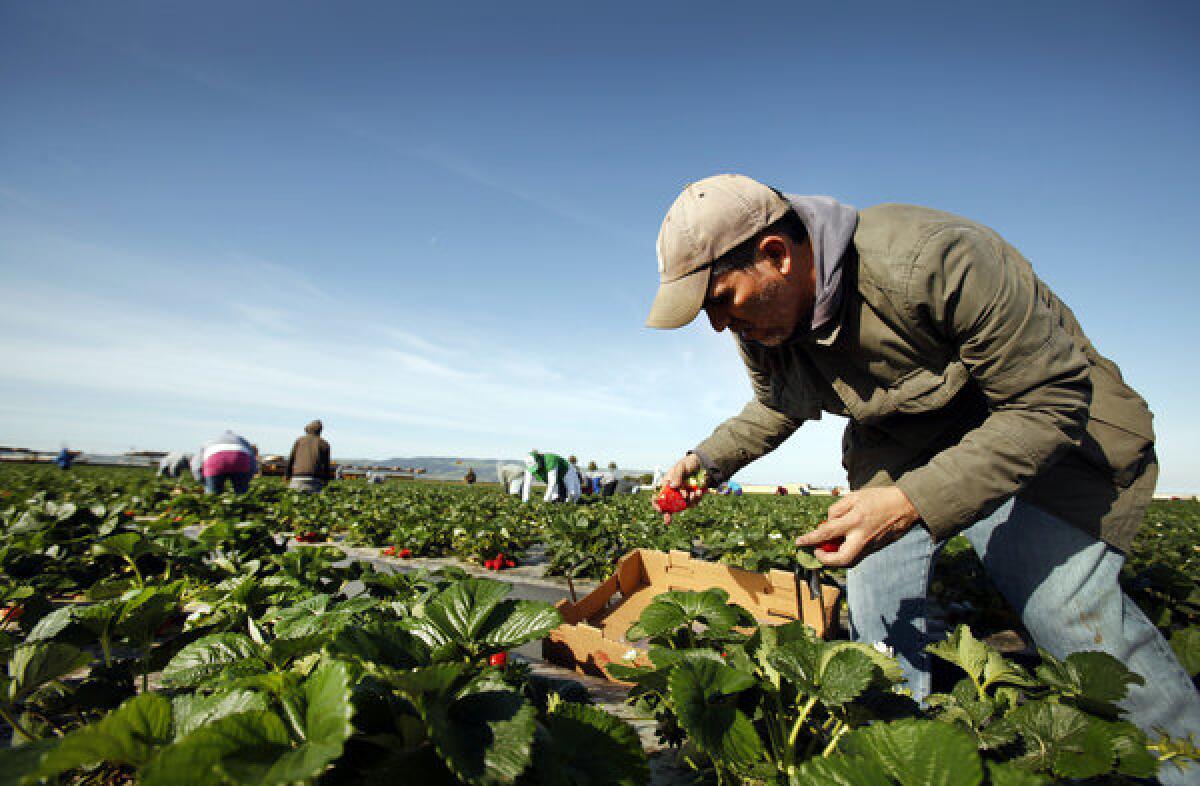
About 30 minutes into my job as a picker, the strawberry fairy left her first gift.
On one of the beds of berries that seemed to stretch forever into the Santa Maria marine layer, Elvia Lopez had laid a little bundle of picked fruit.
She and the other three dozen Mexican immigrants in the field were bent at an almost 90-degree angle, using two hands to pack strawberries into plastic containers that they pushed along on ungainly one-wheeled carts.
They moved forward, relentlessly, ever bent, following a hulking machine with a conveyor belt that spirited away their fruit. But Lopez, a 31-year-old immigrant from Baja California, knew I was falling behind.
And she responded with an act of kindness.
Like the other women, Lopez wore a cap, several layers of clothing and a bandanna over her face to protect her from dust — and, she said, to keep her complexion nice.
I wore the uniform of the other men: jeans, a tad too baggy so that I kept having to pull them up; a sweat shirt with a hoodie and a jacket over it; a baseball cap; and dusty, steel-toed work boots that a daddy long-legs had called home.
But even if I was dressed like the other workers, the clothes felt like a disguise. As soon as I opened my mouth, my fluent but American-sounding Spanish, not to mention my baby-soft hands, gave me away.
I shared that my parents were immigrants too. It was a defense mechanism, I guess, as much as a way of connecting with them. It didn't matter — they probably would have been generous either way.
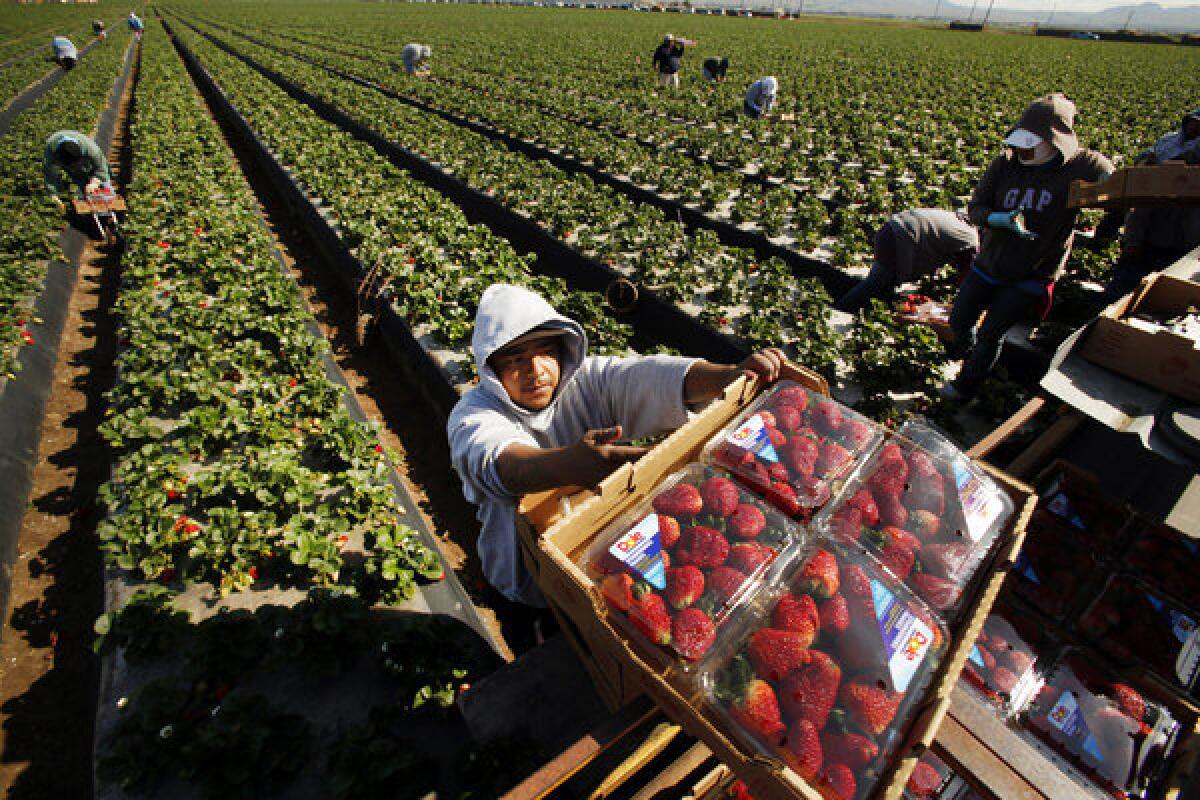
Domingo Suarez, center, carries a box of strawberries picked for Dole Foods. More photos
About an hour into the picking, my upper and lower back were beginning to tighten and my legs began to burn a little from the stooping.
"Listo para el contrato, amigo?" Seferino Rincon, a 42-year-old veteran of strawberry picking from Oaxaca, cheerfully yelled when I was allowed to catch up with the other workers.
He was talking about the super-fast paid-by-the-piece picking — the contract — they were hoping to do tomorrow. I laughed and made a self-deprecating joke about just lasting the day.
And yet, I was already thinking about the second day. My body was holding up all right, even if I was falling woefully behind the other workers and for stretches was almost alone.

A month before, I stood thigh-high in a field of broccoli. I had always imagined that it grew close to the ground, like lettuce.
Mark Teixeira, the owner of Teixeira Farms, which owns much of this land, snapped a long stalk and said: "This is how you eat broccoli." With his front teeth, he skinned the stalk and ate it like a carrot.
He invited me to try it. It was sweet and better-tasting than the broccoli head.
Teixeira, an affable guy with a sharp sense of humor, has argued publicly that Americans are unwilling to do the hard work that's necessary to gather crops. Like other growers, many of them conservative Republicans, he argues for immigration reform that provides for a steady stream of immigrants to do the work others won't.
"Americans don't want to do the fieldwork. They'll go over and make hamburgers for $8 an hour with no insurance, no nothing, when they can make more money here," Teixeira said. "I don't care if you pay $20 an hour, they'll come here one or two days, and they're gone. It's a mind-set: They think fieldwork is below them."
Teixeira was receptive to my idea of picking crops, but he didn't think strawberries were a good idea. Try broccoli, he said.
Broccoli wasn't easy, he said. None of the crops were. But I wouldn't last doing strawberries. A group of broccoli pickers had gathered around us and I asked them which crop they hated picking the most. Almost all mentioned strawberries. How long did they think I'd last?
An older man answered without hesitation: Quince minutos! Fifteen minutes.
The men laughed. A moment later a young man hollered at the older man to stop gabbing and get to work. The men laughed again — the older man was his father-in-law.
Tough crowd. I was glad I wasn't picking broccoli.
Coming back to Santa Maria to start work, I slowed past the strawberry fields, looking at the men and women covered up like Mexican Bedouins, bowed over the earth.

The day began with a lecture on the dangers of pesticides and keeping hydrated, followed by calisthenics I probably hadn't done since physical education in junior high. There was fog and a nice breeze from the Pacific. It wasn't the worst day to pick.
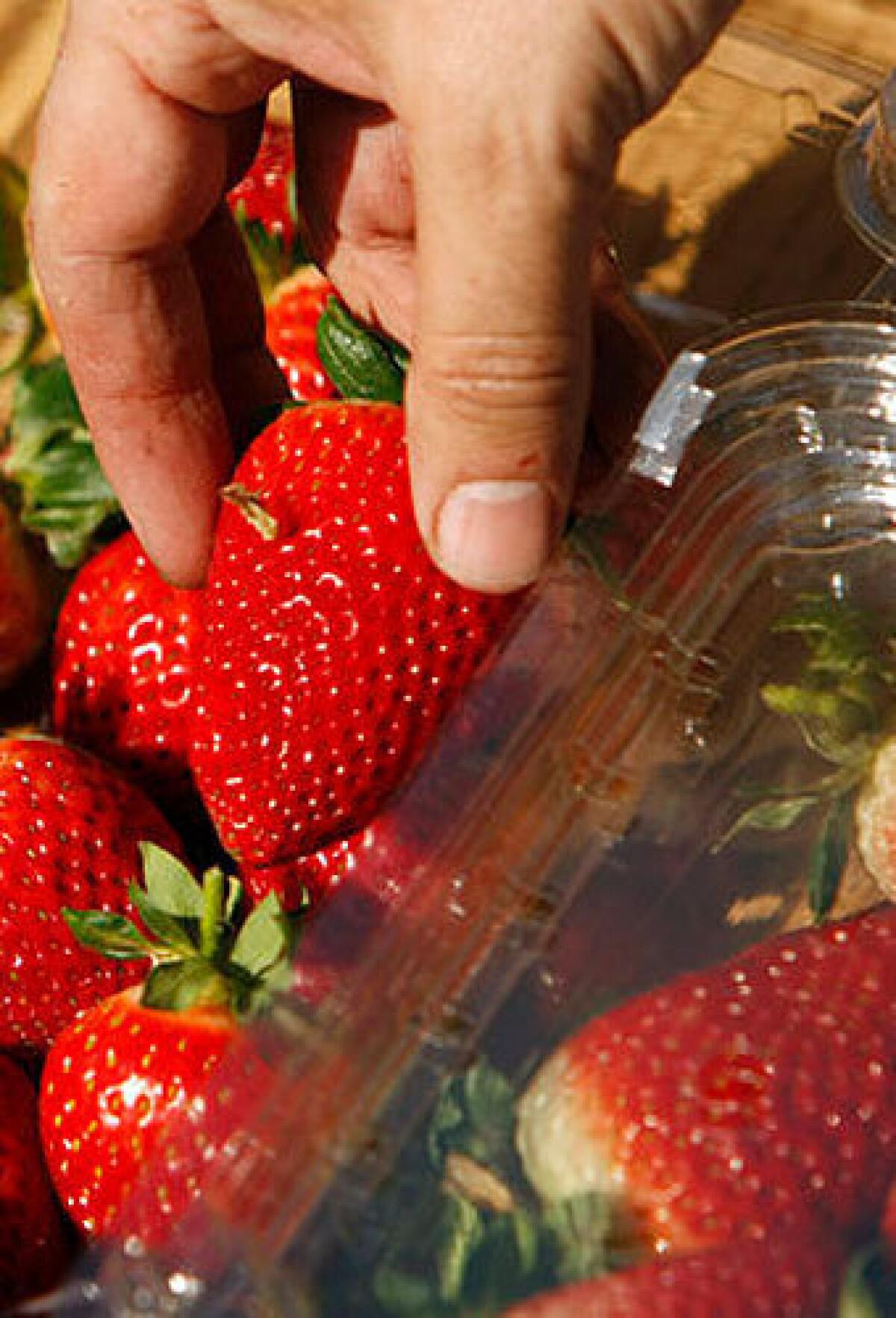
Los Angeles Times writer Hector Becerra packs strawberries into a clamshell box right after picking them. More photos
Antonio Lopez, 34, one of the foremen for Mar Vista Berry, gently urged the workers to leave no good fruit behind.
You might think strawberries are carefully sorted — possibly by a machine — into the clamshells you buy at the supermarket after being washed at some facility. They're not. The strawberries are picked by fieldworkers and placed directly into those containers.
And you don't just throw strawberries into a clamshell and close it. They have to be sorted in a nice way, so that the strawberries on top don't show much of the stem, just their redness.
The strawberries were the largest, ripest I had ever seen. There were fat ones that were completely symmetrical, and others that were huge and flat, like alluvial fans. Others were hook-nosed, like peppers.
The farther behind I fell, the more obsessed I got with shapes.
Sorting the fruit into the clamshells got to be like a game of Tetris from hell. I would stand up like a startled meerkat, looking at a clamshell and trying to figure out how to make the pieces fit.
Then, when I began to fall comically behind, the strawberry fairy would leave another bundle for me. Porfiria Garcia, a 45-year-old Oaxacan immigrant, sidled up, offering encouragement.
She tried working in a restaurant once, she told me, but she felt cooped up. She liked working in the open air, though it was hard work. She worked six days a week, often 10 hours a day, and her Sundays were often spent cooking for her family, doing laundry and preparing for the week of work ahead.
From time to time, she'd take my near full clamshells and find a way to make the strawberries fit. Porfiria said she was glad my parents encouraged me to study. She hoped that for her children and grandchildren.
"What's the use of being born in this country if you don't study?" she said.

That's what my parents wanted from me, my brothers and my sisters.
Two weeks before heading up to Santa Maria, I was reaching into a closet in my parents' Boyle Heights home, looking for an old photo album, when I pulled out a day planner that my dad had kept in 1992.
After coming to America in 1965 in the trunk of a car, my dad took all manner of jobs, including scrubbing toilets. By 1992, he was in his second decade as a machinist in Orange County. It was the job that helped him bring his family of six into the middle class.
No detail of his life was too small for the day planner: like my older brother buying him The Club anti-theft device for Christmas; a son's appendectomy and a wife's surgery; his youngest child's toothache or the parking ticket he got on a Tuesday "por buey" — for being an idiot, in his own words.
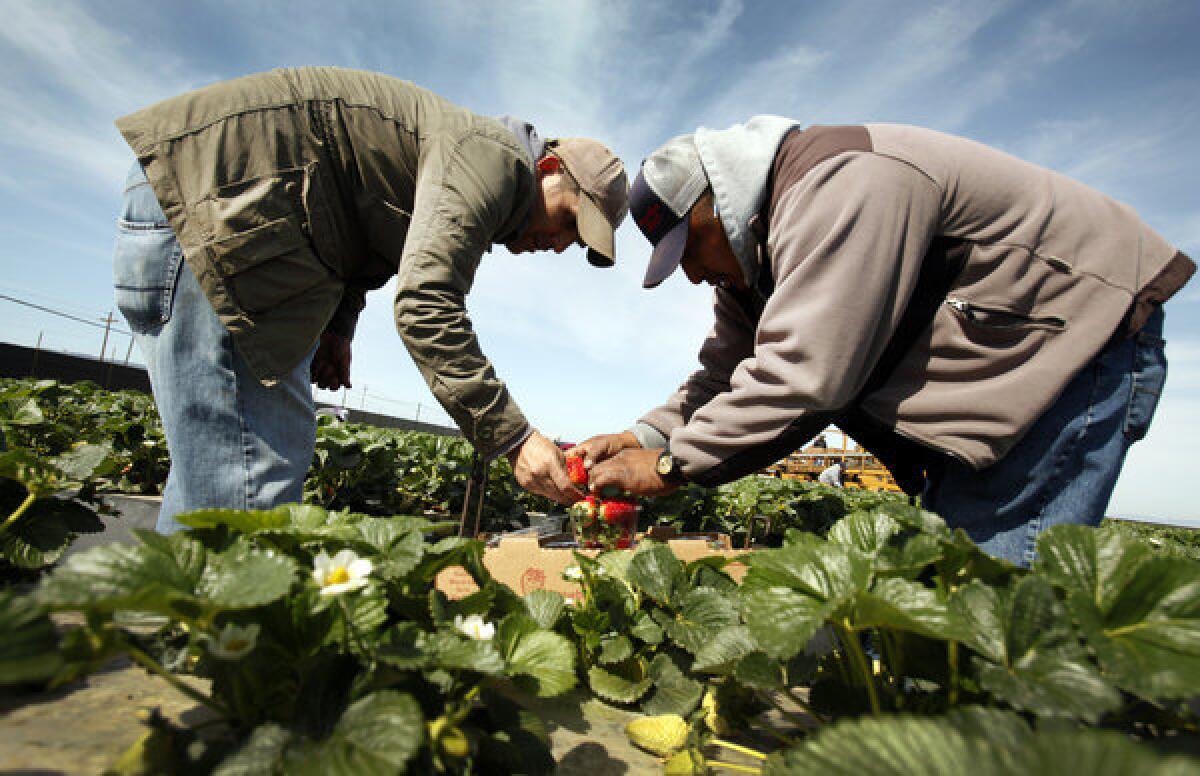
Los Angeles Times reporter Hector Becerra, left, is instructed by foreman Antonio Lopez, right, on how to pack a box of strawberries. More photos
My dad was working six days a week, often more than 12 hours a day. Most of his musing involved bills paid and unexpected expenses for the family. When his car battery went dead or was stolen, that was a calamity. It meant hours of work and money lost.
He fretted over "small checks" he got for "only" eight hours of work and once, with no money to spare, simply wrote: "Ni para el periodico." Not even for the newspaper.
His children, myself included, were a money pit. One January day, he wrote, in a mix of Spanish and English: "Hector olvido luces 'on' —dead battery" after I left my car lights on while studying at UC Irvine. He had to bail me out. A month later: "Hector olvido luces 'on.' Dead battery—Again."
That year, the economy soured and people were being let go where my father worked. He took a buyout.
With my mom he opened a corner dry cleaner, but when that wasn't enough he tried to get another job. Finally, he took a job as an unarmed security guard in South L.A. working a graveyard shift — at a time when L.A.'s murder rate was sky-high.
Americans, whether of Italian or Irish or Mexican descent, often refer to their immigrant bona fides. Sometimes we speak about our immigrant or working-class roots as if our forebears had passed on their fortitude, or that reserve of desperation that made them press forward, to do what they had to do.
I'm the son of immigrants. But I'm not the same as them.

The lunch hour came and, sore and exhausted, I grabbed the Playmate cooler I'd borrowed from my father-in-law and plopped down on the ground.
My lunch selection probably didn't help my field cred: a can of Diet 7-Up, $7 beef jerky, mixed nuts with sea salt. Organic. A banana from the hotel. And a turkey sandwich from a fridge at Dino's Delicatessen.
I had to pay the coyote who brought me here. I had to pay rent, for food. I have to take care of my family. I have to send money to my parents in Mexico."— Domingo Suarez
I ate half a banana and gave up. My appetite was gone.
Noemi Lopez sat next to me. The 21-year-old worked six days a week to pay for four nights a week at a community college. A couple of years of this and study, and she hoped to reach her dream.
"I want to make wines and go to Italy," she said.
Many of the workers said they not only took pride in the work, but enjoyed it in their own way. But others said they worked so hard and for so long for one reason:
"I have to — not because I want to, but because of necessity. I had to pay the coyote who brought me here. I had to pay rent, for food," said Domingo Suarez, a soft-spoken 25-year-old who had herded goats and cattle in Oaxaca and was the father of a 1-year-old American girl.
"I have to take care of my family. I have to send money to my parents in Mexico."
As lunch ended, someone good-naturedly ribbed me, once again, with: "Listo para el contrato?" Moments later, Seferino Rincon, seeing me struggle to keep up, turned to me, pumped his fist and said: "Animo amigo, animo! Ya mero." Keep your spirits, friend, and press forward. You're almost done.
By then I was using my knuckles to prop myself up on the strawberry beds and the cart had become a walker.
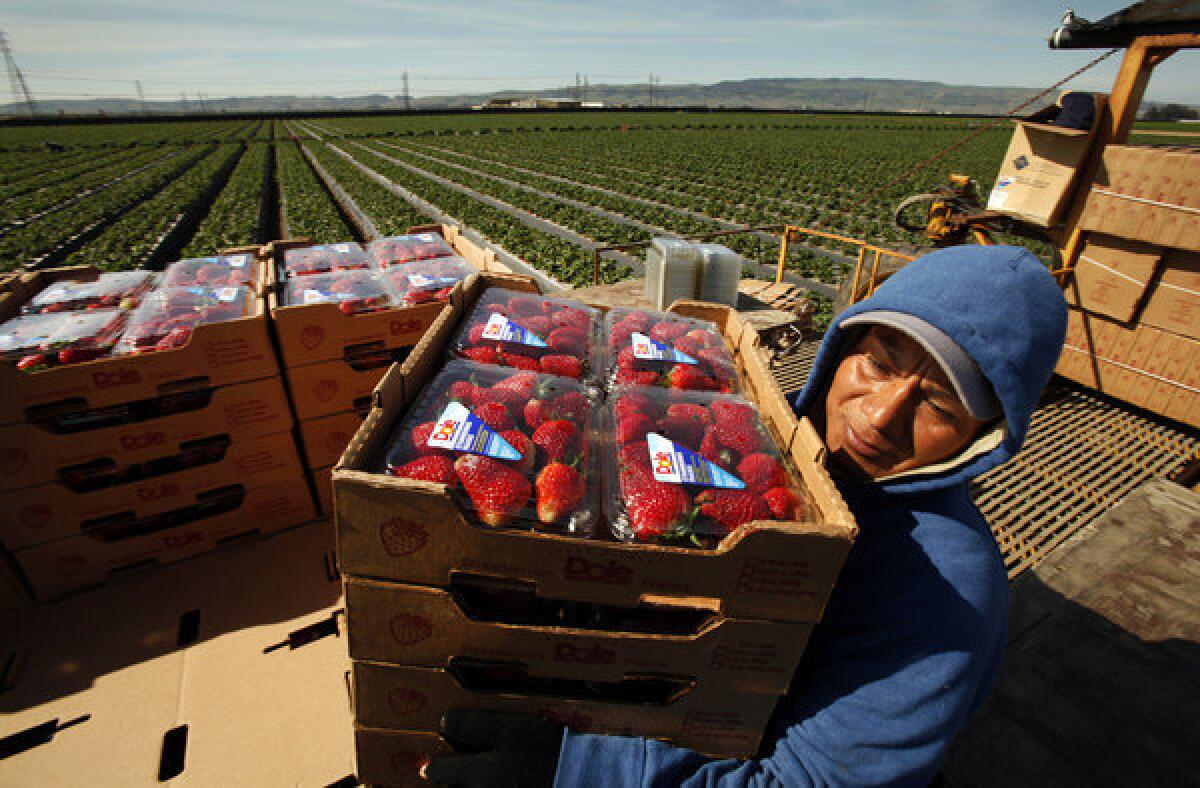
Working on a moving platform, Phillip Sanchez carries and sorts boxes of strawberries freshly picked for Dole Foods. More photos
At about 2:20 p.m., a little more than seven hours after starting work, I took a break to grab a drink of water. After guzzling down six cups of the best water I had ever tasted, I trudged back to my row, boots feeling like they were stuck in sand.
I took a peek at my Blackberry and shook it. I could have sworn more time had gone by. Porfiria Garcia stood next to my cart as I walked back to my row. I debated whether to try to continue.
I surrendered. I didn't need this job. She smiled at me, as if she understood.

Early the next morning, a deep fog blanketed the ground. In the darkness, car lights looked cottony. The workers arrived at yet another strawberry field, but this day was different.
They were going to get their chance to work on el contrato. The best pickers could in five hours of work make upward of $150—or nearly twice as much in half the time.
The workers did their calisthenics, and Antonio Lopez called out before they raced down the field: "Ay que Dios los ayude." May God help you.
Within half an hour, the workers I had picked with a day before seemed more than a football field away, following the machine. A skinny immigrant approached Lopez and shyly asked if there was work. Lopez asked him if he would stay for the entire season — until about December.
"Yes, I want to stay for the entire season," the young man answered. Moments later, work badge in hand, he jogged toward the machine, passing the bowed pickers into the fog.
Contact the reporter | Follow Hector on Twitter
FULL COVERAGE: Debate over immigration
GRAPHIC: See how many Americans finished a growing season in North Carolina
More great reads:
A billiards pro who sinks them all
Migrants find torture, death in the Sinai
WWII poster calls for calm; now it stokes frenzy, feud in England
Sign up for Essential California
The most important California stories and recommendations in your inbox every morning.
You may occasionally receive promotional content from the Los Angeles Times.

